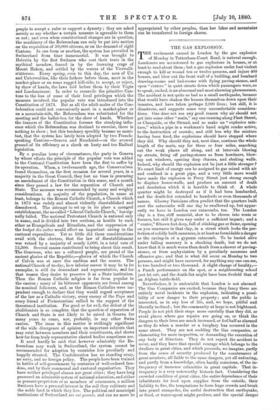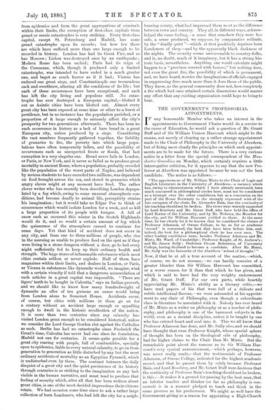THE GAS EXPLOSION.
excitement caused in London by the gas explosion of Monday in Tottenham-Court Road, is natural enough.
Londoners are accustomed to gas explosions in houses, or at least to read about them ; but a gas explosion under foot violent enough to kill or wound ten or twelve persons, and injure 400 houses, and blow out the front wall of a building, and bombard drawing-rooms and, bed-rooms with flying paving-stones, and open " craters " in quiet streets down which passengers were, so to speak, sucked, is an abnormal and most alarming phenomenon. The accident is not quite so bad as a small earthquake, because that would have shaken the houses themselves down upon their inmates, and have taken perhaps 2,000 lives ; but still, it is disastrous, and suggests some very uncomfortable considera- tions. One does not see any good reason why air should not get into some other "main," say one running along Fleet Street, or Cheapside, or the Strand, and so make an "explosive mix- ture," which a pipe in a workman's hand might render active, to the destruction of crowds; and still less why the mixture having been fired, the explosions should have stopped where they did. Why should they not, next time, continue the whole length of the main, say for three or four miles, searching out the weak places all along, and at intervals blowing up streets, firing off paving-stones as from howitzers, blow- ing out windows, opening deep chasms, and shaking walls. Indeed, why should the explosion not be just a little stronger ? No exact limit of energy can be assigned to gas mixed with air and confined in a great pipe, and a very little more would have made the explosion in Percy Street just strong enough to displace house-walls, and produce an amount of death and desolation which it is horrible to think of. A whole quarter might be destroyed as if it had been bombarded, and the death-list extended to hundreds or even thousands of names. Gloomy Parisians often predict that the quarters built over the catacombs will one day be swallowed up, but appar- ently we have in London our catacombs, too. The London clay is a fine, stiff material, slow to be cloven into rents or fissures, but still it gives way under a sufficient impact; and a "crater," fifteeen feet deep, full of stinking gas or flame, opening on you unawares in that clay, in a street which looks the per- fection of solidly built sameness, is at least as formidable a danger as the caving-in of a gypsum catacomb. To be buried alive under falling masonry is a shocking death, but we do not know that it is much worse than death from a shower of paving- stones, or from asphyxiation by a peculiarly nauseous and offensive gas; and that is what did occur on Monday to two persons, and might have occurred, for anything any one can see, to two hundred or two thousand. A slight change of locality,— a Punch performance on the spot, or a neighbouring school just let out, and the death-list might have been fivefold that of an Afghan battle-field.
Nevertheless, it is undeniable that London is not alarmed The Gas Companies are excited, because they fancy there are entirely novel incidents in the explosion, indicating a possi- bility of new danger to their property ; and the public is interested, as in any loss of life, and, we hope, pitiful and liberally inclined ; but the community at large is not frightened. People do not pick their steps more carefully than they did, or avoid places where gas repairs are going on, or think the dangers to their lives are much increased, or feel half as alarmed as they do when a murder or a burglary has occurred in the same street. They are not scolding the Gas companies, or clamouring for more inspection, or demanding the execution of any body of Directors. They do not expect the accident to recur, and they have that special courage which belongs to the dwellers in great cities, and which proceeds, we imagine, partly from the sense of security produced by the countenance of great numbers, all liable to the same dangers, yet all nnfearing, and partly from a knowledge, often hardly conscious, of the in- frequency of immense calamities in great capitals. That in- frequency is a very noteworthy historic fact. Considering the crowded condition of great cities, the entire dependence of their inhabitants for food upon supplies from the outside, their liability to fire, the temptations to form huge crowds and break into grand stampedes, the awful destruction that earthquake, or flood, or water-spout might produce, and the special danger from epidemics and from the great aggregations of criminals within their limits, the exemption of first-class capitals from grand or scenic catastrophes is very striking. Every first-class capital, except St. Petersburg and Madrid, has some grand catastrophe upon its records ; but how few there are which have suffered more than one large enough to be recorded in history. London has had its Great Fire, and so has Moscow ; Lisbon was destroyed once by an earthquake ; Modern Rome has been sacked ; Paris had its reign of the Commune, which, though it produced only a limited catastrophe, was intended to have ended in a much greater one, and begot as much horror as if it had ; Vienna has endured one great siege, and Constantinople one tremendous sack and overthrow, altering all the conditions of its life ; but each of these occurrences have been exceptional, and each has left the city living and populous still. No catas- trophe has ever destroyed a European capital,—blotted it out as Asiatic cities have been blotted out. Almost every great city has been exposed at some time or other to a burst of pestilence, but in no instance has the population perished, or a proportion of it large enough to seriously affect the city's prosperity for two generations afterwards. There has been no such occurrence in history as a lack of bare bread in a great European city, unless produced by a siege. Considering the vast numbers frequently gathered together, the liability of granaries to fire, the poverty into which large popu- lations have often temporarily fallen, and the possibility of occurrences such as unexpected frosts or floods, that last exemption is a very singular one. Bread never fails in London, or Paris, or New York, and it never so failed as to produce great mortality in ancient Rome, where a population, probably crowded like the population of the worst parts of Naples, and believed by serious students to have exceeded two millions, was dependent on food brought across the sea, and stored in granaries which angry slaves might at any moment have fired. The rather clever writer who has recently been describing London depopu- lated by a fog which, owing to some unusual atmospheric con- ditions, had become deadly to animal life, perceptibly strains his imagination ; but it would take no Edgar Poe to think of occurrences which would isolate London for a week, and so kill a large proportion of its people with hunger. A fall of snow such as occurred this winter in the Scotch Highlands would do it, and so would a certain amount of fog which the quiescence of the atmosphere caused to continue for some days. Yet that kind of accident does not occur in any city, and from one to three millions of people, who rise in the morning as unable to produce food on the spot as if they were living in a stone dungeon without a door, go to bed every night sufficiently fed to keep up their ordinary health and strength. The huge stores of inflammable substances which most cities contain seldom or never explode. Half of them have magazines within their limits, and dealers in London, or Paris, er Vienna in substances like dynamite would, we imagine, wink with a certain vivacity if told that a dangerous accumulation of such articles in a great capital was impossible. "There are tigers' teeth to be bought in Calcutta," says an Indian proverb, and we should like to know how many hundredweight of dynamite an offer of ten guineas an ounce would bring from London alone to Somerset House. Accidents occur, of course, but cities with millions in them go on for a century without an accident large enough or appalling enough to dwell in the historic recollection of the nation. It is more than two centuries since any calamity has visited London great enough to be considered historical, unless we consider the Lord George Gordon riot against the Catholics as such. Berlin has had no catastrophe since Frederick the Great's time, Calcutta has never had one since its foundation, Madrid not ono for centuries. It seems quite possible for a great city roaring with people, full of combustibles, specially open to epidemics, liable to every natural calamity, to go on from generation to generation as little disturbed by any but the most ordinary accidents of mortality as an Egyptian Pyramid, which is undisturbed even by them. The contrast between the daily disquiet of a great city and the quiet persistence of its history through centuries is as striking to the imagination as any fad visible in the human narrative, and must tend to produce that feeling of security which, after all that has been written about great cities, is one of the most decided impressions their citizens retain. We had occasion some time since to ask a rather large collection of born Londoners, who had left the city for a neigh- bouring county, what had impressed them most as the difference between town and country. They all, in different ways, acknow- ledged the same feeling,—a sense that somehow they were less safe, a sense produced, we suppose, by comparative solitude, by the "deadly quiet "—which at first positively deprives born Londoners of sleep—and by the apparently black darkness of the nights. The security seems unreasonable to country-folks, and is, no doubt, much of it imaginary, but it has a strong his- toric basis, nevertheless. Anything one would calculate might happen to a "province covered with houses," but nothing does, not even the great fire, the possibility of which is permanent, and, we have heard, worries the imaginations of officials engaged in suppressing fires much more than it does those of the public. They know, as the general community does not, how completely a fire which had once attained certain dimensions would master any effort that any existing organisation could hope to bring to bear.



































 Previous page
Previous page